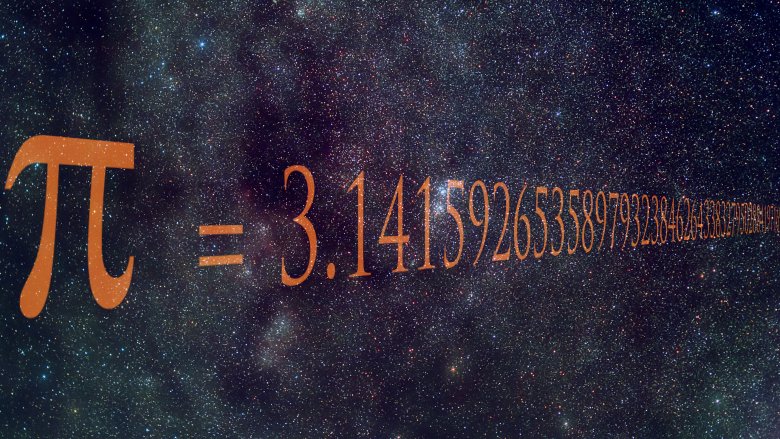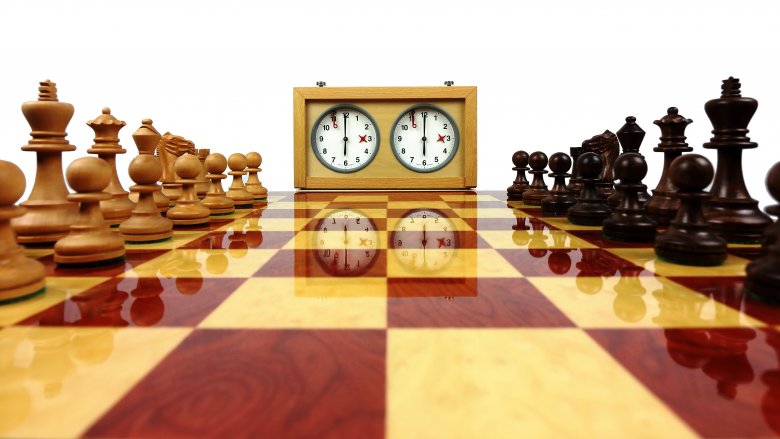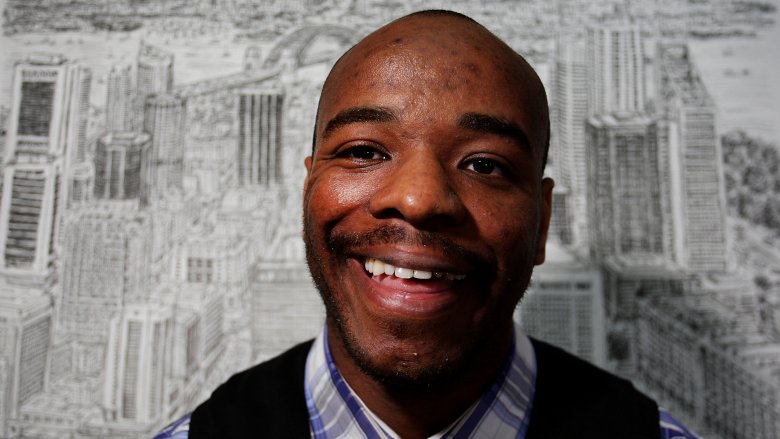Record-Breaking Mental Feats That Blew Everyone Away
You're probably pretty impressed with your amazing feats of memory if you manage to remember when your next dentist appointment is or get all your groceries when you accidentally leave your list at home. But there are people out there who have achieved real mental feats, ones that shocked the world and got them in the record books. These are people with brains so big you wonder how they still fit in their skull.
We all want to believe we're smart, but these people and their achievements might make you feel like you need to go back to kindergarten and just start over because they obviously picked up something the rest of us didn't. Here are some of the greatest record-breaking mental feats ever.
Memorizing pi to 70,000 places
According to The Guardian, in the old days people used to memorize pi because there was a small and reasonable number of known digits. These days, there are so many that remembering all of them would be impossible, so people just do it for fun. If you have a really weird idea of what is fun, anyway.
The current record holder in the Guinness Book of World Records is India's Rajveer Meena, who spent 10 hours of March 21, 2015, saying number after number until he got to the 70,000th digit of pi. NDTV says the previous record of 67,890 had held strong for 10 years.
But there is a pretender to the throne. Japan's Akira Haraguchi claims to have memorized 111,700 digits but for whatever reason has never had his record attempts verified by Guinness. Still, it's a nice pastime for him — he says he recites 15,000 digits a day, taking about an hour, just to stay sharp.
LiveScience will tell you that most of these people weren't just born with amazing memories. It takes a lot of hard work and training to be able to achieve such a superhuman memorization feat. One technique a lot of them use is called a memory palace. You can place the numbers you need to recall in different places around a "palace" in your mind. Then when you need to remember them you just mentally walk from one room to another, looking at all the digits.
48 simultaneous blindfolded chess games
Playing one chess game is hard enough. You have to remember what all the different pieces do and think about four moves ahead of your opponent. There's a reason chess players are thought of as nerds because they have to have some really impressive brainpower.
But what do you do when you're so good at chess that it starts to get boring? Maybe you play more than one game at once. And if even that isn't taxing enough? Throw on a blindfold.
That's how on December 4, 2016, Grand Master Timur Gareyev ended up playing 48 simultaneous blindfolded chess games. The Guinness Book of World Records recognized his amazing feat shortly afterward, beating the previous record holder's 46 blind games. According to Chess.com, it took 19 hours and he did it on just six hours of sleep. He also did it while riding an exercise bike because why not? While some of his opponents were on the young side, they were all accomplished chess players. It's not like he was playing people off the street.
To differentiate the games, he would chat with his opponents beforehand and try to remember their voices. He also used the memory palace technique to keep track of his boards. But playing a bunch of games that you can't see gets less impressive if you lose them all, right? His record was 35 wins, 7 draws, and 6 losses. Eighty percent ain't half bad.
Solving a Rubik's Cube in 4.59 seconds
You probably owned a Rubik's Cube at some point in your life. And you've probably never solved one, no matter how long you lasted before hurling the darn thing across the room. Maybe you even resorted to cheating and peeled the little colored stickers off and replaced them to make it look like you did it.
That last technique is probably frowned on in the world of "speedcubers," and besides, it would take way too long. These people are, to put it nicely, ridiculous. They come up with insanely complicated techniques that they are constantly improving to solve cubes faster and faster.
But it would be no fun just being awesome at this in their rooms at home, so speedcubers get together for competitions. And according to Mashable, it was in October 2017 at one of these events that the new world record was set. Twenty-three-year-old South Korean SeungBeom Cho managed to solve the cube in 4.59 seconds. It was so fast that the people around him in the video take a few seconds to realize what happened. When they do, the room goes absolutely crazy for him.
You would think people can't get faster at this, but the record keeps falling. Take a moment to feel bad for poor Patrick Ponce. SB Nation says he managed to solve the Rubik's Cube in just 4.69 seconds but only held the world record for a month before Cho came along and bested him.
Memorizing a whole business's records
At first when you come across "Memorizing business records" as one of the Guinness Book of World Records amazing feats, you might be a little confused. It's pretty esoteric, even for them. Are there lots of people out there memorizing the business records of Apple and Google and trying to make it into the exclusive book?
It turns out, no. This record has only ever been held by one person and probably won't be beaten anytime soon since it's been around for 180 years. There wasn't a Guinness adjudicator there when it happened, but they included it in the book, so they obviously think it's true.
The story goes that Bartholomew Bidder had an amazing memory. He was born in 1809 and only lived until 1849, but in those 40 years he managed to fit in at least one mean feat of remembering stuff. In 1838 he became an actuary at the Royal Exchange Assurance Company. He probably thought he had landed a sweet gig, but that same year the whole company went up in smoke ... literally. A fire destroyed every single record. But Bidder thought he could reconstruct everything using his awesome brain, and in six months he did. Of course, there was no way to know if what he came up with was right or wrong, but it's in the books so it counts.
Imagine if your computer died and you lost everything on it. Would you be able to reconstruct even that? Thought not.
Learning German in about two hours
For some people, learning one language was hard enough, thank you very much. Being bilingual is only a dream. But maybe we'd all speak multiple languages if it came as easily as it did to Ramón Campayo, a champion of memorization.
Deutsche Welle says in 2003 the Spaniard was traveling to the World Championship of Memorization which was being held in Munich. He had nothing to do on the flight and decided it might be fun to be able to give his speeches in the attendees' native language, so he busted open a book and spent the next two hours (or, as he quickly corrects the interviewer, 1 hour and 40 minutes) learning a brand-new language. More than a decade later he was in Germany for vacation, and he claims he still remembered all of it. He says his trick is to memorize all the important words in the dictionary and associate them with a visual image in his mind. Simple, right?
It might seem like an impossible feat, but Campayo is used to doing crazy things with his memory. According to the Guinness Book of World Records, in 2009 he was able to memorize 68 binary numbers after looking at them for just 3 seconds. That's more than 22 numbers remembered per second. So it stands to reason he might be a whiz at taking in a new language as well. Some people are just too talented.
World's fastest reader
There's a fight brewing for the title of World's Fastest Reader. Depending on where you live, the answer to the question of who can read the fastest might be drastically different.
If you live in the U.S., you might have heard of Howard Berg, who claims to have been the 1990 Guinness World Record holder for fastest reader. According to his bio on Udemy, Berg is said to be able to read 25,000 words per minute and to write 100 words per minute. His amazing ability apparently came from "cutting-edge accelerated learning techniques" he invented. These days he's willing to sell you those techniques and says you'll be able to become a speed reader just like him. But be slightly wary; Skeptoid reported that in 1990 the FTC sued him for false advertising when people who tried his services didn't actually read that much faster.
Meanwhile, the Philippine Star has the story of one Dr. Tess Calderon who in 1971 at the age of just 15 was documented in the Encyclopedia Britannica as reading college essays at 1 second per page. Under laboratory conditions it was found she could read 80,000 words per minute with 100 percent retention.
The problem is that Guinness's official site doesn't list either of these people as the fastest reader. In fact, it doesn't even have it as a record at all. So the world may never know, unless you decide to call them up and try to do better.
The fastest novel in the world
If writing a book was easy, anyone would do it. But there are plenty of people out there who have a great idea but will never get it down on paper. They may or may not be inspired by the fact that the fastest time anyone has written a novel is a mere 9 hours, 5 minutes, and 8 seconds. Of course, all it took was a team of 53 professional writers working together as a team to get it done.
According to the Guinness Book of World Records, this group got together on December 15, 2012. They started at 10:20 a.m. and decided what the book would be about. Then they wrote it, but that isn't all that's involved in the production of a novel. They also had to have editors and get the book ready for printing. The first book rolled off the press at 7:25 p.m., stopping the clock.
The publishing house that was on board with this whole crazy scheme, Editura Art, says the book is 288 pages long, so they didn't try to cheat by writing something short. And they still have the book for sale, in case you speak Romanian and feel like checking it out. The title translates to Santa and Co., and the plot has something to do with Christmas in Romania. Still, might be worth taking a chance on just to own a piece of history.
Drawing cities entirely from memory
This story proves that nothing has to hold you back. National Geographic has the story of Stephen Wiltshire, who was diagnosed with autism when he was just 3 years old, but these days is one of the most famous artists in the U.K. While he hasn't been recognized for any official records, you'll probably agree he must be eligible for one.
Wiltshire's talent is that he can look at something for just a brief period of time, then draw it virtually perfectly from memory. His specialty is cityscapes. He once took a 20-minute helicopter ride over New York City and was able to recreate everything he saw on a 19-foot-long piece of paper. His drawings are accurate down to the number and placement of windows.
Despite not saying his first word ("paper") until he was 5 and the fact that his teachers had no idea what to do with him while he was in school, his amazing memory has made him famous and successful. At 8 he was doing a drawing for the prime minister. He had his own book out by 13. These days he sometimes broadcasts his artistic marathons on webcams that often go viral. In 2006 he was awarded an MBE, something British people get when they're super awesome at stuff.
If you want to own one of Wiltshire's amazing works of art, get in line. As of 2017 there was a 4- to 8-month waiting list.
The 'fastest human calculator'
Depending how old you are, when you were a kid your teacher might have told you it was important to learn math because you weren't always going to have a calculator in your pocket. Those teachers were so wrong, but math is still important, and it's really impressive when people can do it in their heads. And one guy does it better than everyone else. His name is Scott Flansburg and he is known as the Human Calculator.
According to his own website, it was Regis Philbin who gave him that nickname, and it stuck. Flansburg is from Arizona but was in England on April 27, 2000, when he did the impressive feat that got him in the Guinness Book of World Records as the fastest human calculator. He was given a random number (38) and added it to itself 36 times in just 15 seconds. Try doing it just two or three times in that short a span and see if your brain breaks.
Not content to just sit around rolling in all the money and vices that being able to do math really fast in your head must lead to, Flansburg spends his time writing books, appearing on TV, and doing talks, in the hopes that he can convince students and adults alike that math isn't so scary.
Longest sequence of objects memorized in 1 minute
Sometimes remembering stuff can bring families together. Like in the case of 28-year-old Santhi Sathyan from India, whose husband is her coach. That's right, there are even coaches for people whose only sporting achievement is thinking really hard. Sathyan had been training hard for seven years, and in 2017 it all paid off when she got into the Guinness Book of World Records.
According to The Hindu newspaper, she had been doing mental exercises since she was in school but never thought of entering a competition until her friend encouraged her to. And the gamble was worth it. Her feat was memorizing a long sequence of randomly placed objects. Sathyan was only given 60 seconds to take them in before they were shuffled. Then it took her just 2 minutes and 57 seconds to put all of the objects back in the correct order. Before that the previous record had stood for two years.
Now Sathyan wants to go even further and win the World Memory Championship. But she's not only thinking about herself, since she also wants to get kids into the memorizing game. Yes, our next generation of leaders may have superhuman memories. Let that scare the poop out of you.








